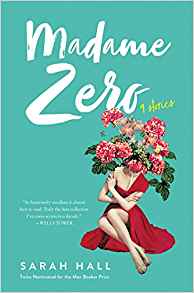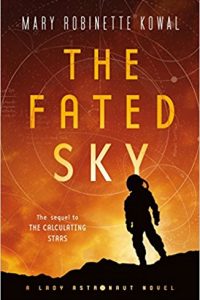Rachel Swirsky Reviews Madame Zero by Sarah Hall
 Madame Zero, Sarah Hall (Custom House 9780062657060, $23.99, 192pp pages, hc) July 2017. Cover by Eugenia Loli.
Madame Zero, Sarah Hall (Custom House 9780062657060, $23.99, 192pp pages, hc) July 2017. Cover by Eugenia Loli.
Madame Zero by Sarah Hall begins with a woman turning into a fox, and ends with one struggling to become herself.
Hall’s collection features nine stories, some speculative and others not. All are invigorated by her literary style of character-driven thematic explorations, written in a witty, mellifluous voice.
“Mrs. Fox”, the story that begins the collection, is told from the perspective of a husband achingly in love. Unexpectedly, inexplicably, his wife turns into a fox, taken from him in what he terms “the absurdist possible way.” Although he tries to keep her with him, she yearns for prey, wilderness, and exploration, and eventually he must release her.
As a wife, she is “part unknowable, as all clever women are.” As a fox, she is even more inscrutable. “Mrs. Fox” explores alienation and identity – how, despite love, people always remain, on some level, unfathomable.
The story that ends the collection, “Evie”, resonates strongly with the first, although Evie’s husband views her with vaguely affectionate indifference. When Evie begins behaving oddly – indulging in decadent foods, pornography, and profligate sex – he doesn’t question the origin of her changes. He responds as if it’s only natural for her identity to be mercurial.
This proves disastrously wrong when Evie seizes, and scans reveal an enormous, benign brain tumor that has affected her inhibitions and personality. Had her husband been more attentive, had he known his wife better, he could have identified the symptoms.
These two stories are the strongest in the collection, and most clearly underscore Hall’s recurring themes of alienation, identity, and the impossibility of truly understanding ourselves and others.
“Case Study 2” is another rumination on the nature of self, this one about a child, Chris, who is raised by a commune to possess a collective sense of identity. As his therapist teaches him to view himself as “I” instead of “we,” his functioning improves, but the change eventually kills him. He cannot possess both a collective and individual identity: they are violently antithetical.
Some of the stories feature more straightforward speculative extrapolation. Set in the near future, the brutally intense “Theatre 6” tells the story of an anesthesiologist who risks her career to save the life of a woman whose nonviable fetus cannot legally be removed. “One in Four” extrapolates the 1918 flu epidemic into a future setting. “Later, His Ghost” is a more complex post-apocalyptic reworking of The Tempest, featuring a compelling and pitiable main character.
(Though neither is speculative, and my space is limited, I must also note that both “Luxury Hour” and “Goodnight, Nobody” are very good.)
Hall’s feminist themes show in most of these stories. The cover gestures at the dehumanization and transformation of Evie and Mrs. Fox with an illustration of a 1950s housewife whose head has become a flowering plant. “Theatre 6” – rapid, savage – is a visceral cry to action.
Hall’s themes and style remind me of other female fantasists working in the field, particularly Kelly Link and Carmen Maria Machado. Her excellent stories deserve recognition both inside and outside of the speculative community.
This review and more like it in the December 2017 issue of Locus.







